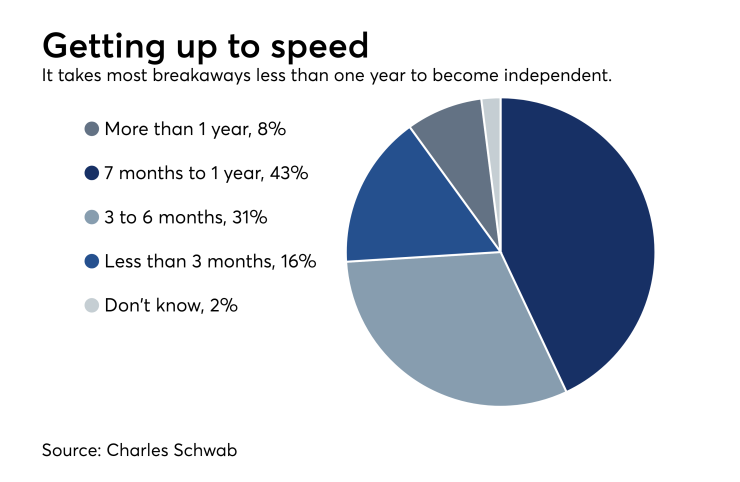It's not only legally dubious for wirehouse brokers planning to go independent to solicit clients for their new firm, it's unnecessary, says Tim Oden of Schwab Advisor Services.
"If you're a trusted advisor, your clients will find you," Oden said at a media briefing in New York City. "You don't have to cut corners."
Wirehouses seeking a temporary restraining order to block breakaways are becoming "more sophisticated" in being able to find out if brokers have presolicited their clients, according to Oden, senior managing director for business development for Schwab.
Wirehouse employees who think they are "smarter than the wirehouses" are making a big mistake, he warned. Brokers who try to "short circuit the system usually do something foolish," Oden said.
Shirl Penney, CEO of the New York-based platform provider Dynasty Financial Partners, whose firm specializes in breakaway transitions, seconded Oden's admonition to wirehouse brokers.
"The forensic analysis wirehouses undertake to track [broker] activity is pretty significant," he noted.
Flaunting employment agreements just isn't worth it, Oden and Penney agreed, citing a new Charles Schwab survey of advisors who have started or joined an RIA in the last seven years. According to the survey, breakaways who become independent retain 87% of their clients on average.

More than 90% of advisors surveyed who made the move said they would do it again and are happier after going independent. Seven in 10 said they increased their revenue.
Nearly three-quarters of breakaway brokers took one year or less to move their clients and complete their transition to become an RIA.
The breakaway exodus shows no sign of slowing down, said Oden.
"We're not anywhere near the peak," he said, citing robust M&A activity and high volume of "assets in motion."
But breakaways considering making the move have to be very judicious, Oden cautioned.
A successful transition has to be carefully choreographed, he explained, and advisors have to "understand what they can and can't do."
He urged wirehouse brokers planning to become RIAs to get legal counsel and to "be respectful" of their current employers.
They — and their spouses — also need to be all in, said Penney.
"Becoming a RIA is like learning a foreign language," he explained. "It needs to be a full commitment. And spouses have to be on board, because [starting a new firm] means having two jobs for at least 12 months."
But the effort is worthwhile, said Jeff Farrar, who started Procyon Private Wealth Partners less than two years after leaving UBS.
Procyon was able to tap new sources of revenue and potential growth that were unavailable at UBS, according to Farrar, the firm's executive managing director.
"Economics were important but control was more important," Farrar explained.
Having the freedom to offer and choose better services for clients has been a primary driver for breakaways, Oden said. "The client-driven need has been very strong," he noted.
A fatter bottom line can also be enticing, Penney added.
After spending 20% of a firm's revenue for variable costs and 15% for fixed cost, an independent advisory firm can gross 65%, allowing advisors to bring home approximately 50% more than they could at a wirehouse, Penney said.
The top advice from advisors who have already made the leap?
Break away as soon as possible after careful planning and preparation. And, expect the process to be longer and harder than you think.





